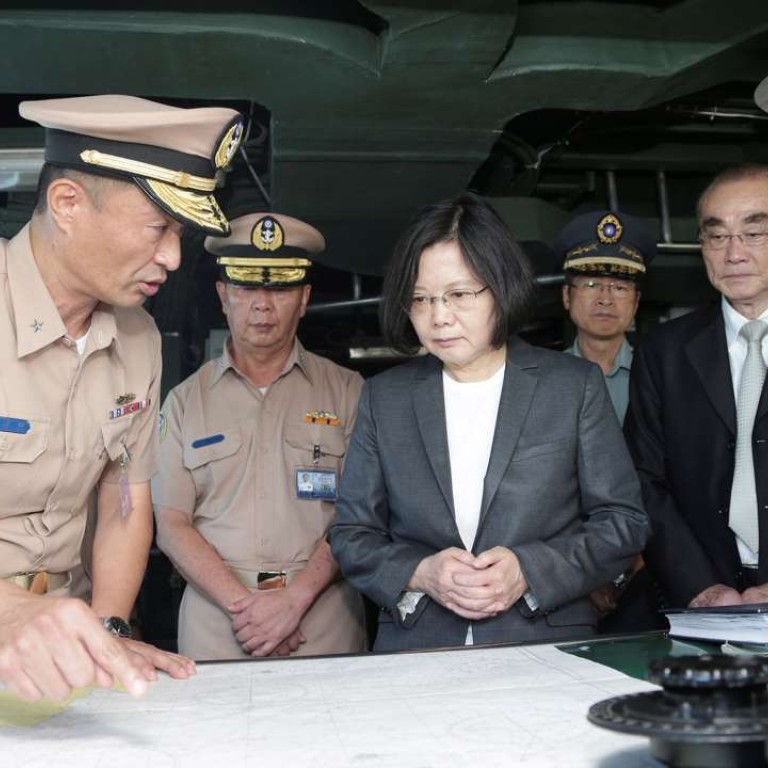
Trouble in Taiwan: Hague ruling on Taiping Island gives Tsai her biggest headache
Analysts say Taiwanese president has been stabbed in the back by US and Japan, two countries she had been relying on for support in row with Beijing
Call it bad luck. From the devastation caused by a powerful typhoon to an international ruling that torpedoed Taipei’s claim to an exclusive economic zone in the South China Sea, Taiwanese President Tsai Ing-wen has faced a host of challenges in her first two months in office.
But the biggest challenge, analysts say, is the cross-strait tightrope she has been walking after apparently being stabbed in the back by the United States and Japan, two countries she had been counting on when dealing with pressure from the mainland.
Because of the US influence, Taiping Island thus becomes a rock and this is the biggest betrayal of Taiwan’s [interest]
And that tightrope act could get even trickier, they say, if she presses ahead with an evasive cross-strait policy, because Beijing is unlikely to abandon its demand that she accept the “one-China” principle.
Since Tsai assumed office on May 20, catastrophes including the flooding of the island’s main international airport, a massive strike by flight attendants, the accidental misfiring of an anti-ship missile that killed a fisherman, a pipe bomb explosion that wounded 25 people on a commuter train and a bus fire that left 24 mainland tourists dead have followed one after the other.
Analysts said her biggest challenge so far stemmed from the July 12 tribunal ruling at the Permanent Court of Arbitration in The Hague that no land features – including Taiwan-controlled Taiping Island – in the contested Spratly archipelago in the South China Sea could be considered islands.
That ruling caught the Tsai government off guard because Taipei was never officially consulted throughout the arbitration process, which was initiated by the Philippines against Beijing over territorial and other disputes in the South China Sea. However, the court did accept written evidence from the non-government Chinese (Taiwan) Society of International Law about Taiping Island’s status.

Analysts said the US was behind the case, because it wanted to check Beijing’s expansion in the South China Sea, but it had indirectly dragged Taiwan into troubled waters.
“Because of the US influence, Taiping Island thus becomes a rock and this is the biggest betrayal of Taiwan’s [interest],” said political commentator Wang Hsing-ching, who writes under the pseudonym Nanfang Shuo.
The downgrading of Taiping’s status means that under the International Convention on the Law of Sea, Taiwan can only assert claims to territorial waters extending just 12 nautical miles from it, not an exclusive economic zone of 200 nautical miles.
The Tsai government has responded by flatly rejecting the ruling. In addition to issuing statements asserting its rights and sovereignty, it also moved forward by one day a regular navy patrol mission to the South China Sea to uphold Taiwan’s rights over the Spratlys.
But critics of Tsai’s US policy accused her of humiliating Taipei by kowtowing to Washington through her government’s silence when the US and Japan called on Taiwan and other claimants to follow international law and avoid escalating tensions in the region.
“No one opposes a friendly Taiwan-US relationship,” said Julian Kuo, a former legislator of Tsai’s independence-leaning Democratic Progressive Party. “But if such a befriending is to the extent of humiliating ourselves … and even to the denial of our rights to the exclusive economic zone of Taiping Island, the Taiwanese public obviously will not agree to such a no-limit pro-US policy.”
Wang said the Tsai government should not become so timid that it allowed the US or Japan to take advantage of Taiwan in the hope they could be used to counter the mainland.

Analysts said Beijing was well aware of Tsai’s strategy of seeking to unite Washington and Tokyo in order to counter pressure from the mainland over her reluctance to recognise the “1992 consensus” – an oral agreement reached by non-governmental intermediaries at talks in Hong Kong in 1992 to the effect that both sides of the strait agree there is only one China but that each has its own interpretation of what one China is.
“It is unlikely that Tsai will openly accept the [1992] consensus, at least in her first four-year term in the face of the majority opinion that opts for the status quo,” said Wang Kung-yi, an international relations and strategic studies professor at Taiwan’s Tamkang University.
Beijing has stopped official communication with Taipei due to Tsai’s refusal to recognise the consensus, which it says is the political foundation for the two sides to continue talks and exchanges.
“But it is also unlikely for Beijing to wait indefinitely, as it expects her to finish the test paper the mainland has deemed incomplete,” Wang said.
In her inaugural speech, Tsai acknowledged there was a meeting in 1992 at which the two sides tried to seek common ground over differences. She also offered to maintain the status quo in line with the constitution of the Republic of China – Taiwan’s official title – a commitment some analysts said was quite close to the one-China concept of the consensus.
In a recent interview with The Washington Post, Tsai said she looked forward to mainland President Xi Jinping showing “a bit more flexibility in dealing with cross-strait relations”, suggesting that she hoped Beijing could understand the situation she faced in a democratic society that could not ignore public opinion.
Liu Guozhen, director of the Taiwan Research Institute at Xiamen University, said the two sides had yet to find common ground on the consensus.
“Beijing hopes the DPP government can directly accept the concept of the 1992 consensus, but it also understands the difficulty Tsai is facing,” Liu said, adding the term “1992 consensus” could be replaced by any terminology as long as it contained the one-China core meaning.

